Sorry for the delay in this post—Toradora! kind of took over and everything else went to the backburner. I also heard that this episode of Akatsuki no Yona was a good one, so I didn’t want to rush through the episode or the post.
Having seen this episode, that was a good choice. One’s of Yona‘s greatest strengths is its phenomenal ability to balance oppositional fundamental forces, pairing them, contrasting them, synchronizing them, and clashing them against each other. This episode, though, was much more personal in its choices—a bit of a shift from the more universal balances we’ve seen to this point. And, brilliantly, the focus was on the senses: on touch, sight, and sound. I don’t have any superlatives left for this episode after spending them all on Twitter, so let me simply say it. This episode was very, very good.
A Different Village
The first thing that struck me this episode was how radically different the Blue Dragon’s village was from Ki-ja’s. Although both greeted Yona’s arrival in the same sort of manner—surrounding her party in a veiled and threatening circle (mist and masks)—the passive, silent creepiness of this village was far less comfortable than the bold confrontation of Ki-ja’s village. Yona has always been good at modulating tones, but the surface parallels of their first interactions with the villagers help to highlight how much different this village is from Ki-ja’s.
Of course, the behavior of the villagers in both villages is a reflection of the way they thinking about their respective dragons. Like how the mythology of the White Dragon informed the entire culture of Ki-ja’s village, the “curse” of the Blue Dragon similarly effects the way the village forms its culture. They’re aren’t proud to be a people sheltering a man of immense power; they’re frightened and ashamed, and so they hide themselves in caves and cover their faces with masks. And as expected of people accustomed to hiding, the way they talk and interact with others is tangential and filled with insinuations.
Ki-ja’s frustration with the Blue Dragon hiding serves to emphasize through a personal conduit the differences between the two. Ki-ja doesn’t have the experience to make sense of others’ life situations (important also to note that this is exactly what Yona is out to do), so he tries to impose his own expectations and life onto the Blue Dragon’s. His explanation to Yona in the tunnels, “Like me, the Blue Dragon comes from a long line of dragons,” gets brilliantly deconstructed in the Blue Dragon’s backstory. Where Ki-ja’s lineage has given him expectation of purpose, the Blue Dragon’s has given him nothing but pain and isolation.
Ao’s part of the Blue Dragon’s story is perhaps the most tragic of all, as he’s a good man who’s been crushed by the hate of those surrounding him—and now he must watch someone else live out the same fate, watch a child have his humanity ripped away from him again and again by his power and by the cruelty of their society. His bestial howl at the moon—”I am human!” —was both liberating for him and awful for the Blue Dragon. After all, if Ao only became human in death, what does that make him but a monster in life?
The Intimacy of the Senses
It’s ironic that Yun describes the first sense of being watched as being “stared at with giant eyes.” This is a village where the people wear masks, and yet the sensation of the eye, an organ completely devoted to sight, is the one that strikes him. There’s a lovely contrast, then, when the candles around Yona go out and she’s suddenly stripped of the ability to see, just as those without masks are. Other senses take over, and the one we begin with is touch. In the villager’s hand, touch becomes dangerous.
But the Blue Dragon’s entrance is one of sound, and his touch is gentle and safe. Why should that be so? As we understand in his backstory, it is because sight for the Blue Dragon has become terrible. Touch and sound have become the senses through which he can can express warmth and kindness. Of course he would live in the dark. He doesn’t need or want to see.
Even the shots in the Blue Dragon’s backstory are based around obscured sight, as huge beams block out pieces of the frame and bodies do the same. And yet, at the same time, we get painfully beautiful visuals like Ao and the Blue Dragon walking across the mountain plateau in the sunset. Moments of beauty thus become moments of tragedy. Everything dealing with sight is tinged with pain, but touch and sound are beautiful, wonderful things. They’re the only source of positive connection the Blue Dragon has had with anyone—and certainly they will be his salvation in the end.
Catalogue of Character Moments
- Yona establishes her identity as an individual, not as a reincarnation of Hiryuu.
- Selfish, greedy, demanding Yona is an awesome force to be reckoned with.
- Yona squealing over the squirrel was pretty darn cute. One of her most moe moments yet.
- Yun is the one who freaks out most about Yona being lost, even butting in between her and Hak.

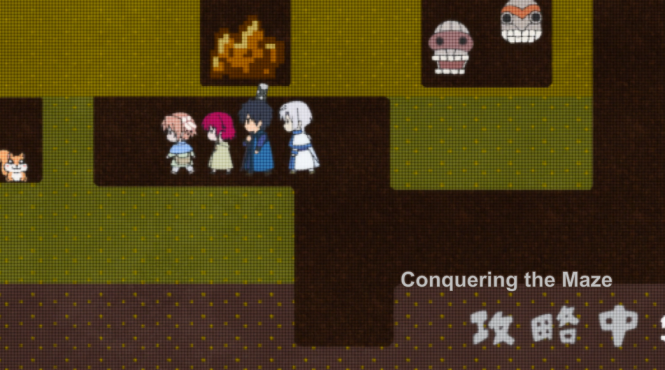
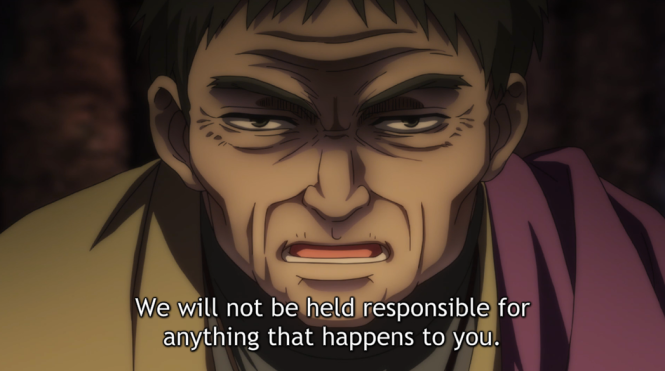
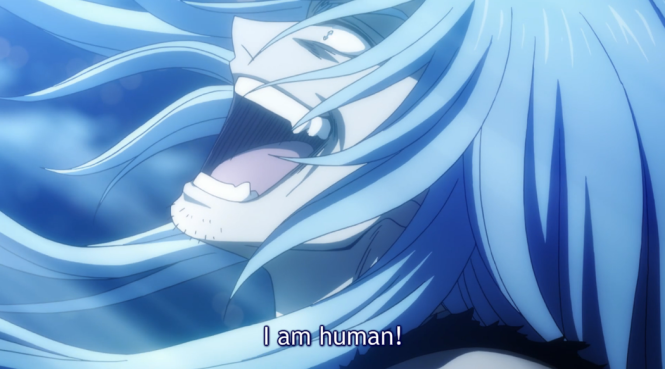
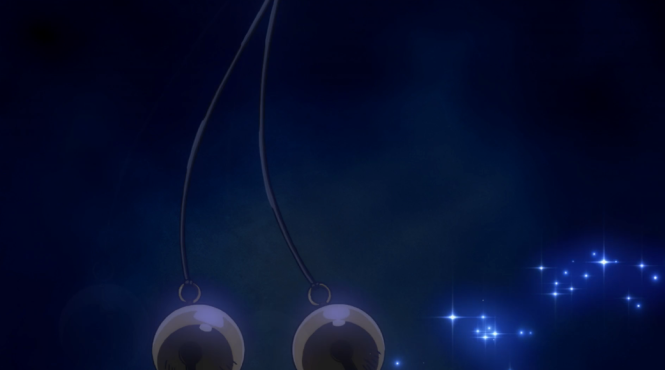
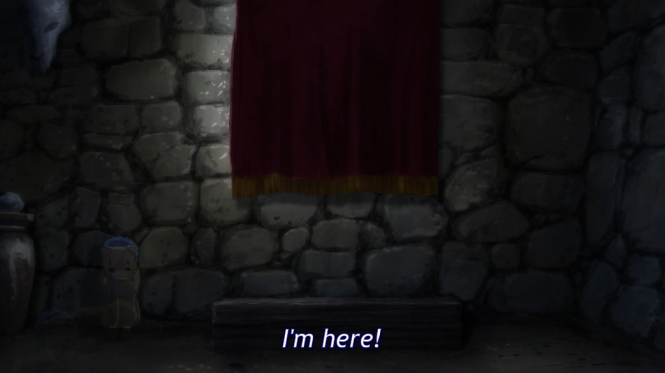
I think episode 12 was probably the best (and definitely my favourite) one of the series to date, for all the reasons you write about here. I have a feeling that the Blue Dragon is also going to become a favourite character of mine in the episodes to come – and it’s not just a matter of “aww, so angsty”, either, but rather that of all the male characters, he has the most compelling backstory so far. Can’t wait to see more!
LikeLike
I dunno if you’ve seen episode 13 yet, but it was pretty great, too.
I doubt the Blue Dragon will be able to surpass Hak as my favorite character—both in comedy and in his internal conflicts, I find Hak more compelling—but yeah, this backstory was like getting kicked in the gut over and over again. The “I am human!” moment and the “I am here” moments were chillingly similar in their language and meaning, and yet so far apart in their tones.
LikeLike
Yup, just saw it a couple of hours ago and really liked it – though I still think 12 had the edge in terms of emotional impact.
LikeLike
Oh, definitely agreed. 12 was devastating; 13 was “just” the superbly executed extension of it.
LikeLike